PPP
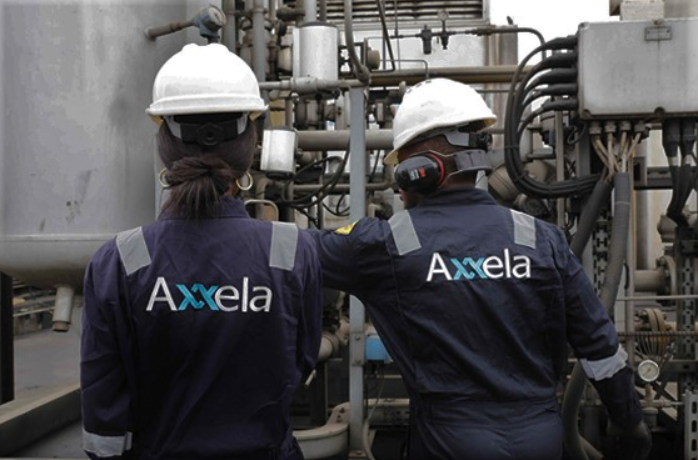
Axxela’s new gas plant to expand Nigeria’s gas infrastructure following bond success
Axxela Limited, a leading African gas and power company owned by Helios Investment Partners and Sojitz of Japan, has announced a Final Investment Decision to develop a 50 million standard cubic feet per day (MMscf/d) gas processing plant in Delta State, as it pushes towards sustainable energy solutions in Nigeria. This decision is bolstered by Axxela’s successful ₦16.4 billion bond issuance earlier this month, which was oversubscribed by 109 percent. The announcement comes as Axxela continues to expand its footprint in the energy sector, following last year’s agreement with BUA Group, one of Africa’s largest conglomerates, and CIMC ENRIC, a global leader in the energy equipment industry, to build a 700-ton-per-day mini liquefied natural gas (LNG) project. The new gas processing plant, expected to begin operations by the end of 2024, will start with a 12 MMscf/d modular unit and is designed for rapid expansion, with the potential to increase the plant’s output to 50 MMscf/d within 18 months. It is a key part of Axxela’s strategy to support the Nigerian government’s Decade of Gas initiative and to enhance domestic gas utilization. Strategically located in OML 152, the gas processing plant is expected to serve as a central processing hub for surrounding oil & gas operators, with the potential to transform gas flaring into a valuable economic resource, and significantly reduce CO2 emissions. “We are positioning to develop requisite infrastructure for natural gas processing and last mile distribution that creates market access for at least 20% of Nigeria’s gas demand,” Axxela’s Director of Business Development, Franklin Umole, said in a company statement. “Over the past two decades, we have been at the forefront of natural gas advocacy, and this project is a further reaffirmation of our dedication to gas infrastructure development and our vision to deliver innovative energy solutions across Nigeria and Africa.’’ In preparation for the project, Axxela has secured a long-term feedstock supply agreement with a leading local upstream company and established equipment supply arrangements with top-tier Original Equipment Manufacturers (OEMs). Upon completion, the processed gas will support various market segments, including Compressed Natural Gas (CNG) for vehicles, industrial feedstock, and decentralized power solutions, marking a significant step towards energy security and economic growth in Nigeria. Boost from successful bond issuance In a related financial achievement, Axxela recently raised ₦16.4 billion in an oversubscribed bond issuance, despite challenging economic conditions marked by rising interest rates and limited market liquidity. The funds will be instrumental in realizing the gas plant project. “This is a significant indicator of increasing investor confidence in our company’s reputation, brand, and performance,” CEO at Axxela Bolaji Osunsanya said. “The bond proceeds will support the development of our growth projects, signifying the importance of local and international capital markets in the development of critical infrastructure.” With the FID and successful bond issuance, Axxela looks to advance Nigeria’s gas infrastructure, support the energy transition, and meet the increasing demand for cleaner energy solutions.
Read more »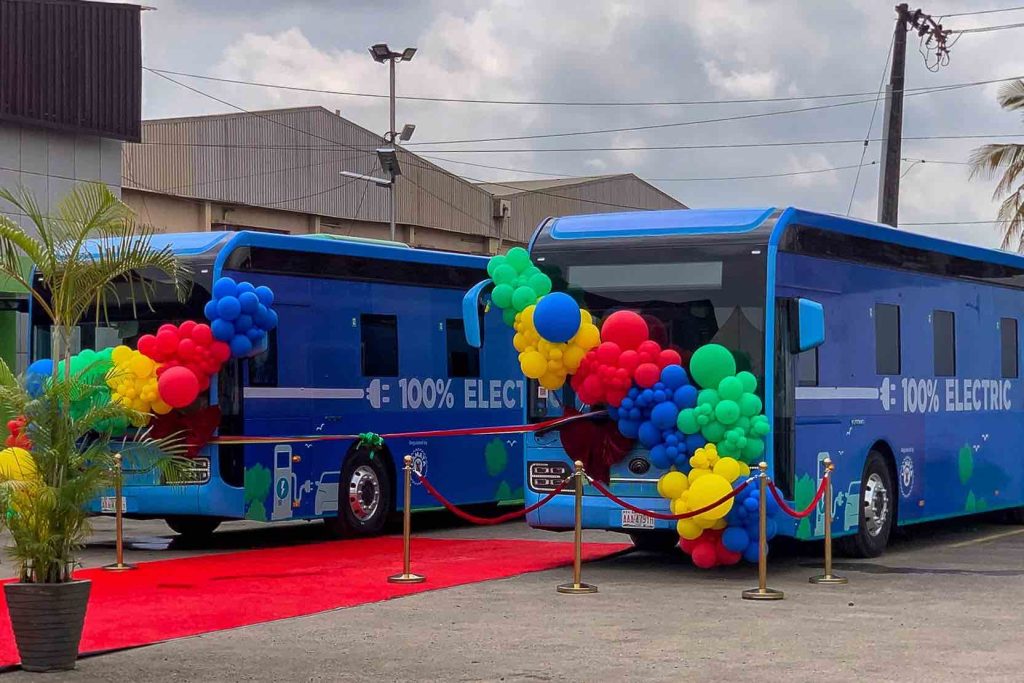
Lagos launches first electric buses in Nigeria
Lagos has officially launched the pilot programme for the implementation of its electric vehicle (EV) mass transit buses in the Nigerian commercial hub, as it pushes to become a modern-state with investments in green and modern transports. The Lagos Metropolitan Area Transport Authority (LAMATA) is partnering with Oando Clean Energy Limited (OECL) to launch the proof-of-concept with two electric buses that will ply the Bus Rapid Transport (BRT) lanes in the state. The mass transit bus, equipped with air conditioning and WIFI, comes with a capacity of 80 passengers for both seating and standing commuters. OECL has taken delivery of some charging stations and spare parts. OECL, a subsidiary of the Nigerian multinational oil company Oando, is teaming up with China’s bus maker Yutong to put 12,000 electric buses on Nigerian roads over the next seven years. The partnership between Oando and Yutong also envisages the construction of a local assembly plant for the electric buses to boost indigenous capacity. Partnerships for sustainable public transport “This is a pivotal moment for Lagos State and the country at large,” CEO at OCEL, Ainojie Irune, said in a statement. “The development of a sustainable transport ecosystem is much more than the deployment of electric vehicles; it’s about reducing the carbon footprint of the seven million public transport commuters and positively impacting the socio-economic indices surrounding transportation. For us at OCEL, Lagos State is only the beginning, we look forward to replicating this model nationwide through strategic partnerships across the public and private sectors.” Lagos State, Africa’s largest city with roughly 30 million people, is expected to save some $2.6 billion in fuel and maintenance costs, as it transits from the current combustion mass transit system to an electric powered scheme. “This is a watershed moment for Yutong,” Managing Director, Yutong West Africa, Frank Lee, said. “It’s our first delivery of electric mass transit buses in Sub-Saharan Africa and the first step in the large-scale deployment of an electric powered public road transport system in Nigeria. I must commend the collaborative efforts of the Lagos State Government through LAMATA in seeing this project through.” Lagos is modernising its logistics infrastructure for urban mobility. Despite delays, the state has made steady progress on its Lagos Rail Mass Transit network currently being developed under the Lagos Strategic Transport Master Plan. The development of the master plan was supported and funded by the World-Bank and notably identified 14 Bus Rapid Transit (BRT) corridors, six rail lines and one monorail.
Read more »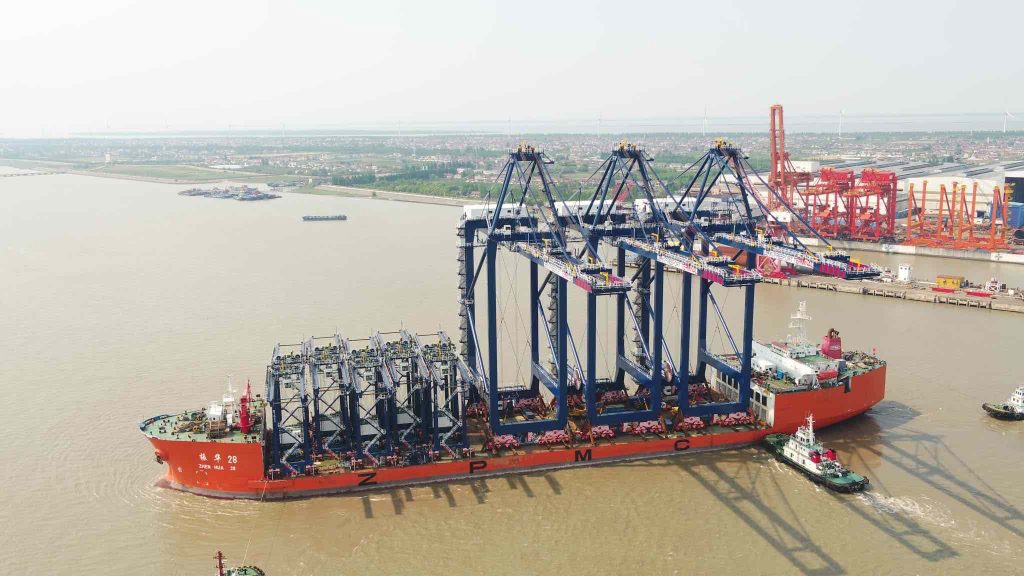
Nigeria targets maritime economy with seaport projects
Nigeria has approved seaport development projects in three states of the country’s southern region as part of push to expand port infrastructure and services that will boost revenue in Africa’s biggest economy. The Federal Executive Council’s approval will allow the development of the Ondo Multi-purpose Port in Ilaje, Ondo State; the expansion of Snake Island Terminal in Lagos State; and the expansion and development of Burutu Seaport in Delta State; all through public-private partnerships (PPP). By 2030, Africa’s Blue Economy, a key priority area of the African Union’s Agenda 2063, is estimated to grow to $405 billion, generating 57 million jobs, according to the African Union. For Nigeria, the development of seaports projects could strengthen its position as a major hub and gateway within Africa’s growing maritime economy. As the Nigeria Ports Authority confirmed the approval of seaport projects in the states of Ondo, Lagos and Delta, the Authority provided insights into what it means for Nigeria and development partners. Ondo Deep Sea Project The Ondo State Government, along with its partners, incorporated the Special Purpose Vehicle (SPV) Port of Ondo Development Limited to design, finance, operate, maintain, and transfer the Ondo Multi-Purpose Deep Sea Port at a total project cost of $1.48 billion. It’ll be fully funded by the proponent for a concession period of 50 years. Projected revenues accruing to the Federal Government are expected run into $50 billion in royalties and other fees in marine services, while the proponent is expected to receive USD $2.6 billion in profits throughout the concession tenor. The Ondo Deep Sea Project will be developed in two phases. Snake Island Port According to the Nigeria Ports Authority, this project would expand the existing port facility from the current single berth to 4 terminals with 3 km of quay, 7 ship berths, and 11 barge berths, with 6 to 13.5 meters of the draft on a total area of 90 hectares. It would comprise container, bulk, and multipurpose (general cargo/RoRo) terminals. The Snake Island Port facility, located within the Snake Island Integrated Free Zone (SIIFZ), would be expanded at a total cost of $974.1 million for a concession period of 45 years. Projected revenues accruing to the Federal Government stand at $18 billion in royalties and marine services, while the proponent is expected to receive $5.23 billion in profits throughout the concession tenor. Burutu Port Project The Burutu Port project in Delta State, proposed by Messrs. Akewa Colmar Services Ltd., has been conceptualized as a mining, inland transportation, logistics base, operating as a transshipment hub for the provision of other port services in western and central Africa. As part of the project, the old port at Burutu will undergo rehabilitation while a greenfield port, proposed for Agge in Delta State, would be developed. The project is estimated to cost $1.2 billion for a concession period of 40 years. Projected revenues accruing to the Federal Government stand at $125 billion in royalties and marine services, while the proponent is expected to earn $9 billion in profits throughout the concession tenor. The project will be developed in three phases. Revamping ports infrastructure for growth and development “These projects are the results of the Federal Government’s drive, through the Federal Ministry of Transportation (FMT) and the Nigerian Ports Authority (NPA), to improve port services, increase revenues, and take pressure off the existing ports and critical infrastructure,” the NPA said in a statement, adding the Infrastructure Concession Regulatory Commission (ICRC) have issued Certificates of Compliance to the port projects. Many of Nigeria’s existing seaports, inherited from the colonial administration, have struggled to function efficiently over the years. But the country is ramping up investments to reverse the trend. At the beginning of this year, Nigeria commissioned the Lekki Deep Seaport, next to the Dangote Refinery, on the east of Lagos. The port, which is the largest in Nigeria, is expected to end cargo congestion in Lagos and cut waiting times offshore.
Read more »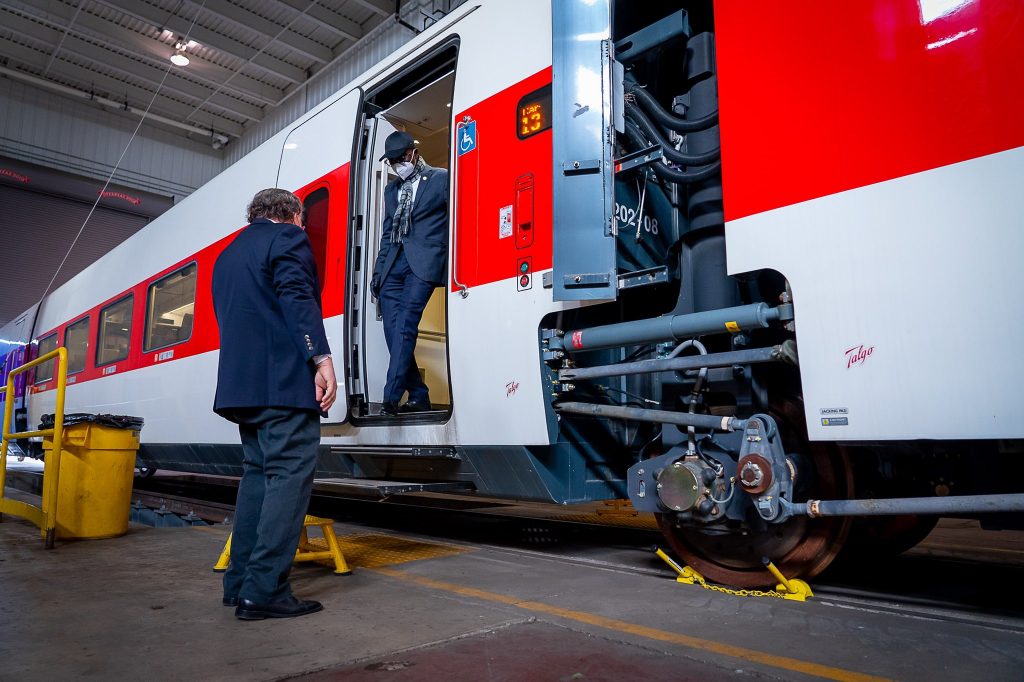
Lagos State issues pre-qualification notice for the concession of the Lagos Blue Line Rail Project
On Wednesday this week, the Lagos Metropolitan Area Transport Authority (LAMATA) issued a request for application for the pre-qualification of the concession of the Lagos Blue Line Rail Project, which will run from Marina to Okokomaiko. The line is part of the broader Lagos Rail Mass Transit (LRMT) network currently being developed under the Lagos Strategic Transport Master Plan. The development of the master plan was supported and funded by the World-Bank and notably identified 14 Bus Rapid Transit (BRT) corridors, six rail lines and one monorail. While Lagos started with the construction of the bus rapid transit corridors, two of which are already operational, the state is now building two rail lines, known as the Blue and Red ones. The Blue Line counts 13 stations and will run on a 27km East-West axis from Badagry to Marina on Lagos Island. The Red Line will run on a 37km North-South axis from Agbado to Marina and is under-construction after breaking ground in 2021. The Blue Line will be the first to be operational but the project has been split into two phases to ease its development. The first phase is a 12.5km stretch from Mile 2 to Marina that will start operating at the end of 2022 and will function as a proof-of-concept for Lagos’ future metro system. The second phase consists in doing the rail works on the remaining 14.5km stretch. It is for this second phase that the Lagos State Government is now seeking reputable and experienced railway developers, EPC contractors, rolling stock and equipment manufacturers, operators, and financiers. “These service providers will be expected to form Consortia comprising of all the required service providers, and should provide technical, operational and financial capabilities to enhance their qualification,” LAMATA said in its notice. Applications and expressions of interest must be submitted to KPMG by March 2nd, 2022.
Read more »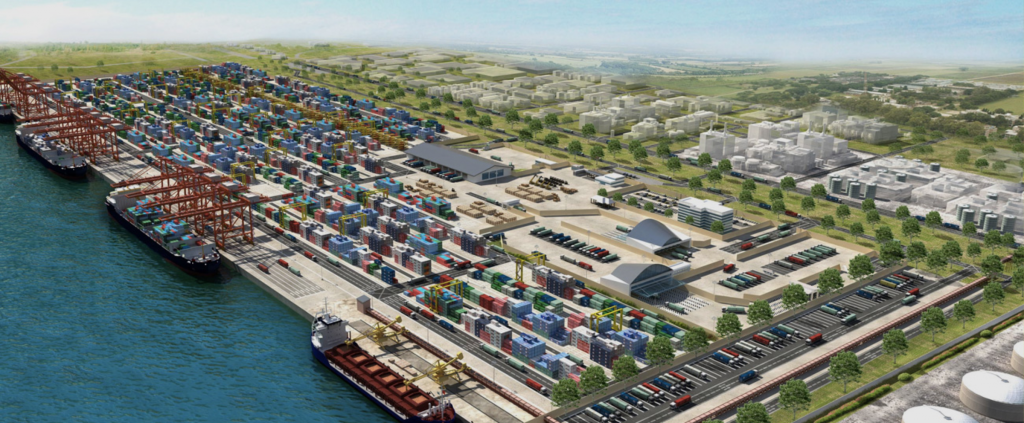
The Lekki Deep Sea Port is over 70% complete
The Lekki Deep Sea Port was over 70% as of late October this year, its promoters have revealed. The project’s construction and development is being undertaken by Lekki Port LFTZ Enterprise Limited (LPLEL), a special purpose vehicle promoted by the Tolaram Group and China Harbour Engineering Company Ltd (CHEC). CHEC injected US$221 million into LPLEL in March 2020 and became the company’s controlling shareholder with 52.5%. The remain shareholders are the Tolaram Group (22.5%), the Lagos State Government (20%) and the Nigerian Ports Authority (5%). LPLEL was awarded the concession for 45 years by the Nigerian Ports Authority (NPA) on a Build, Own, Operate and Transfer (BOOT) basis. Under the agreement, the company is required to develop, finance, build, operate and, at the end of the concession term, transfer the port to the NPA. All major infrastructure components are over 50% complete including land side infrastructure (55.38%), the quay wall (74.13%), the breakwater (74.13%) and the dredging and reclamation works (82.19%). Upon completion, Lekki Port will have a total of 3 container berths, 1 dry bulk berth and 3 liquid berths.
Read more »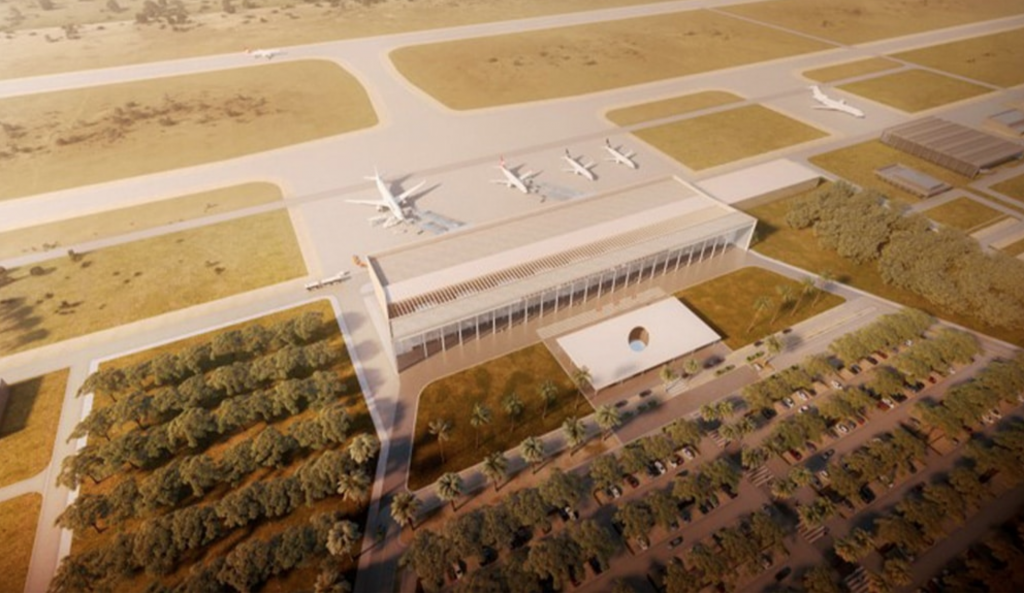
Meridiam signs $250m Concession Agreement for Burkina Faso’s Donsin-Ouagadougou Airport
Earlier today, Meridiam signed a 30-year concession agreement with the State of Burkina Faso for the conception, construction, financing, operation and maintenance of a new international airport 35km northeast of Burkina Faso’s capital Ouagadougou. The project is now progressing towards financing close. The engineering and construction works are expected to start at the end of 2022 and last for about 30 months. Meridiam has partnered with Aéroport Marseille-Provence (AMP) as a technical partner under a technical assistance contract. AMP will also be a minority shareholder in the special purpose vehicle set up for the project. The project is expected to cost about €220m (over $250m) and represents one of Bukina Faso’s biggest public-private partnership (PPP) initiatives. Once completed, the new Donsin international airport will replace the current Ouagadougou-Taamsê International Airport built in the 1960s and located in the centre of Ouagadougou.
Read more »